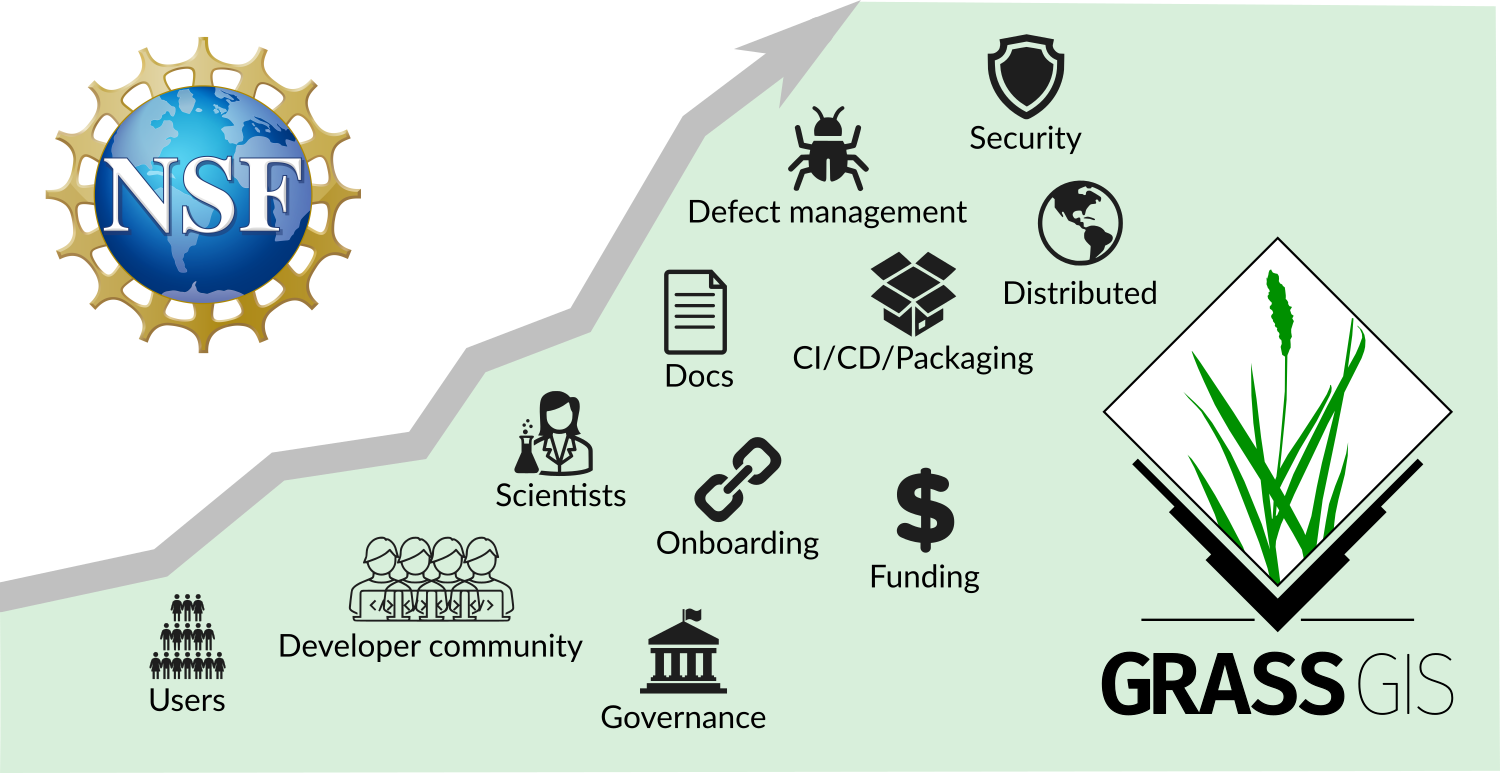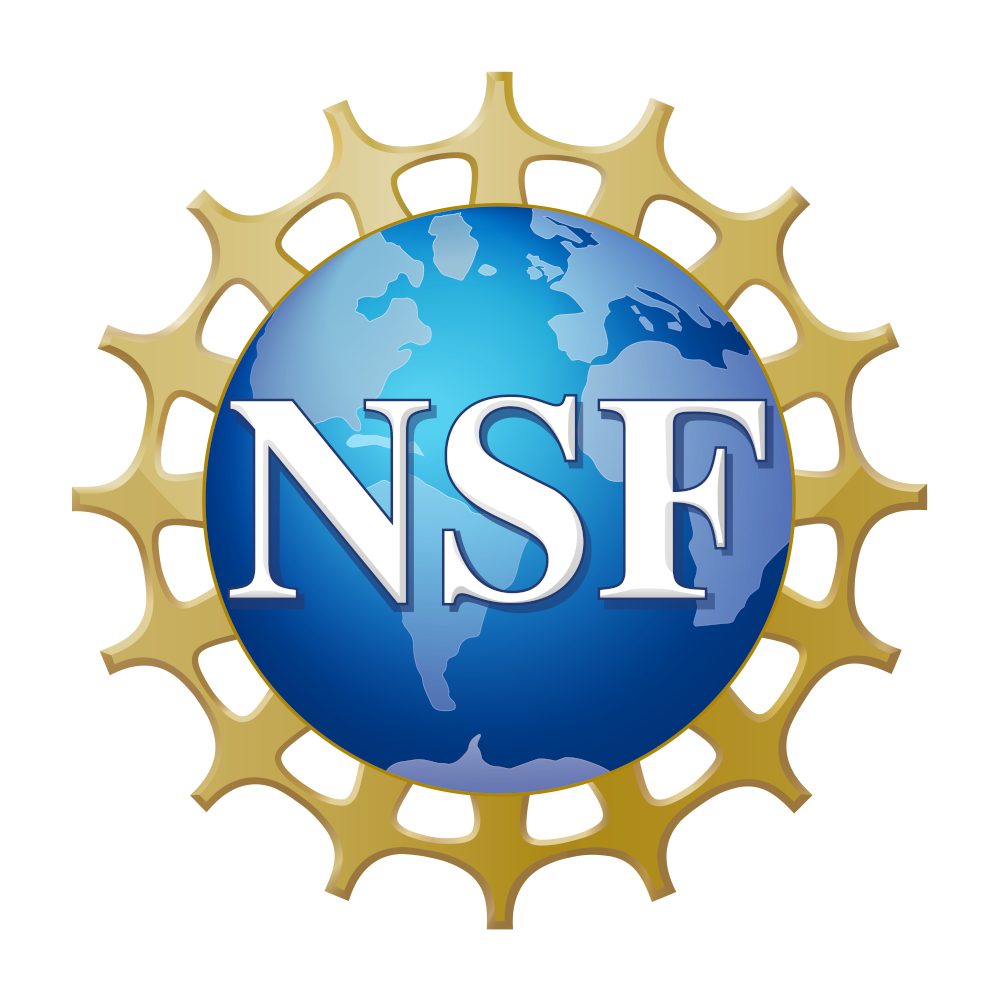NSF POSE Project 2023-2025 Timeline: Difference between revisions
Veroandreo (talk | contribs) (→3rd quarter report: add gsoc topics) |
Veroandreo (talk | contribs) (→Documentation: more details in docs) |
||
| Line 124: | Line 124: | ||
=== Documentation === | === Documentation === | ||
* Documentation Working Group met and planned the development of new tutorials. | * Documentation and Education Working Group met and planned the development of new tutorials. Veronica Andreo met other GRASS developers and contributors to coordinate further tutorials development. | ||
* Development of new [https://github.com/ncsu-geoforall-lab/tutorials tutorials] in progress, topics include: | * Development of new [https://github.com/ncsu-geoforall-lab/tutorials tutorials] in progress, topics include: | ||
** Getting started with GRASS GIS | ** Getting started with GRASS GIS | ||
| Line 134: | Line 134: | ||
* New [https://github.com/OSGeo/grass/blob/main/doc/development/style_guide.md GRASS Programming Style Guide] | * New [https://github.com/OSGeo/grass/blob/main/doc/development/style_guide.md GRASS Programming Style Guide] | ||
* [https://github.com/petrasovaa/cookiecutter-grass-addon New addon template powered by Cookiecutter] | * [https://github.com/petrasovaa/cookiecutter-grass-addon New addon template powered by Cookiecutter] | ||
* Analysis of options names and functionality in plotting tools: | |||
** [https://github.com/OSGeo/grass-addons/issues/1071 Addons for plotting: Standardize parameters and flags] | |||
=== Other sustainability activities === | === Other sustainability activities === | ||
Revision as of 13:32, 11 June 2024

To inform GRASS community about the work done as part of the award 2303651 from the U.S. National Science Foundation (NSF) to enhance GRASS ecosystem, the following report summarizes the progress and outcomes in quarterly reports and presents the roadmap for the project.
The two main goals of the project are: 1) to facilitate the adoption of GRASS GIS as a key geoprocessing engine by a growing number of researchers and geospatial practitioners in academia, governments, and industry; and 2) to expand and diversify the developer community, especially through supporting next-generation scientists to gain expertise to maintain and innovate GRASS software.
Principal investigators and senior personnel:
- Helena Mitasova, North Carolina State University (Principal Investigator)
- Vaclav Petras, North Carolina State University (Co-Principal Investigator)
- Anna Petrasova, North Carolina State University (Co-Principal Investigator)
- C Michael Barton, Arizona State University (Co-Principal Investigator)
- Huidae Cho, New Mexico State University (Co-Principal Investigator)
- Giuseppe Amatulli, Yale (Senior Personnel)
Other personnel who is joining for the execution of the grant is listed below when relevant.
1st quarter report
Project Announcements and Communication
- Announcement on GRASS website.
- Info session to explain the POSE Project (Announcement on GRASS user mailing list, 2 sessions for different time zones).
- Collected statistics from GitHub, X and others and set up automated collection for GitHub.
Conference Presentations
- Parallelization Tips for Geoprocessing with GRASS GIS by Anna Petrasova at FOSS4GNA, October 2023.
- GRASS GIS: Not What You Think by Vaclav Petras at FOSS4GNA, October 2023.
- Computational Notebooks for Reproducible Geospatial Computation in Research and Education by Caitlin Haedrich at FOSS4GNA, October 2023.
- State of GRASS GIS: 40 Years Strong and Counting by Huidae Cho at FOSS4G Asia, November 2023.
Training and Workshops
- Unlock the power of GRASS GIS by Anna Petrasova and Caitlin Haedrich at FOSS4GNA, October 2023.
- Develop Geospatial Workflows and Custom Tools with GRASS GIS by Vaclav Petras and Corey White at FOSS4GNA, October 2023.
- Big Data Computing with GRASS GIS by Anna Petrasova and Vaclav Petras at NC State GIS week, November 2023.
- GIS Week Workshop: High Performance Computing for Geospatial Analysis (GRASS GIS part) by Vaclav Petras (main lecture lead by Andrew Petersen from NCSU OIT) at NC State GIS week, November 2023.
- Geocomputation and Machine Learning for Environmental Applications training course announced. GRASS GIS part led by Giuseppe Amatulli is free of charge thanks to the support by NSF.
Community Sprint Participation
Anna Petrasova and Vaclav Petras remotely participated in OSGeo 2023 code sprint doing PR reviews and maintenance of GRASS GIS code, documentation, and website.
Mentoring Program
- Started a development-oriented mentoring program announced with details available on a wiki page.
- Program now has 4 participants (from 12 responses) supported by email and video calls.
- Program already resulted in improvements to GRASS GIS core and addons:
- merged PR: grass.script: ensure memmap content is flushed before writing to a raster
- radar addon toolset PR: Add i.saocom and i.sar toolsets
Mentoring Program is a new effort started and so-far performed only by the POSE team.
Student Grants Program
Student grants announced with topics at a wiki page. Student Grants Program is an existing effort which the POSE team participates in.
Working Groups
Four working groups created (scope, wiki page, coordinator, and a list of people for each).
Citations
- GRASS GIS Google Scholar account updated with more complete records.
- A form was created to collect new and missing records.
- Profile link added to GRASS website Contribute and Citation page.
2nd quarter report
NSF I-Corps program
Corey White, Vaclav Petras, and Anna Petrasova participated in a 4-week long intensive mandatory training that draws on the methods, customer discovery, and curriculum of the NSF Innovation Corps and applies them to open-source projects.
The program included conducting 70+ 30-minute interviews with both GRASS users and non-users to better shape the future path of GRASS GIS and the POSE project. So far, the interviews focused on educators, companies, researchers, influencers and it focused more on non-users than users.
Next steps, include processing the collected qualitative data, developing possible future directions for sustainability of the project, discussing these with the Project Steering Committee, the core team of developers, and the broader community.
Mentoring Program
The development oriented mentoring program welcomed 5 new participants from various institutions including universities, USGS, US Army Corps of Engineers, and local municipalities. The discussed topics covered developing workflows for topography and network analysis, environmental modeling, and geophysics. Participants were supported by email and video calls.
Conference Presentations
- Modeling vegetated stream buffer impacts on water depth and discharge at the watershed scale with GRASS GIS and Jupyter Notebooks by Caitlin Haedrich at AGU, December 2023.
- OpenPlains: A Web-Based Platform to Democratize Geospatial Participatory Modeling on the Cloud by Corey White at AGU, December 2023.
Presentations and Workshops
- Intro to GRASS GIS by Vaclav Petras and Anna Petrasova was remotely delivered to geographers at Vanderbilt University in February 2024. The workshop was developed in Jupyter Lab and run using WholeTale online platform.
- Introduction to GRASS GIS Geospatial Processing by Corey White at SMathHacks hackathon, March 2nd. SMathHacks is the annual 36-hour hackathon hosted by the NC School of Science and Math, open to all North Carolina students. Students collaborate to build innovative software projects, explore new technologies, and have fun along the way. The workshop was delivered in person with students using Google Colab.
Student Grant Program
Linda Karlovska participates in the Student Grant program with her project Easy command history navigation through the History browser panel. Student Grants Program is an existing effort which the POSE team participates in by mentoring.
Code Security
Vaclav Petras mentors four students who create code security improvements in their NCSU class CSC 472: Cybersecurity Practicum. So far, the students created two PRs which were successfully merged:
- grass.script: Change insecure mktemp to NamedTemporaryFile #3444
- utils: fixed shell vulnerability in mkrest.py #3451
Two other PRs are open and more work is underway to do first steps for new approach to a more secure code.
Localized Basic Datasets
- NCSU and ASU teams worked on localized versions of GRASS basic data set following the North Carolina basic data set example, preparing Flagstaff, Arizona and Nepal draft version with basic layers
3rd quarter report
Mentoring Activities
The mentoring program form received 2 new responses and mentors were actively working with 3 mentees.
Linda Kladivova finished her project developing History browser in the GRASS GUI as part of the GRASS Student Grant Program. Mentor's time was covered by POSE.
GRASS GIS has 3 students this year for Google Summer of Code. Time spent managing GSoC for GRASS GIS was covered by POSE.
The topics covered by GSoC projects are:
- Add EODAG support to GRASS GIS
- Improve GRASS user experience in Jupyter Notebook
- Add JSON output to different GRASS tools in C
Presentations, Workshops, Event Planning
- GRASS 101: From GUI Clicks to Writing Scripts (TNGIC 2024) by Veronica Andreo and Caitlin Haedrich
- Coastal evolution analysis and inundation modeling with GRASS GIS (CSDMS Workshop 2024) by Caitlin Haedrich and Pratikshya Regmi, see also blog post with images
- Organization of GRASS Community Meeting Prague 2024 and budget planning by Vaclav Petras
CMake transition
Ongoing work on CMake compilation was partially covered by POSE.
Code Quality and Security
Vaclav Petras mentored four students who created code security improvements in their NCSU class CSC 472: Cybersecurity Practicum. TODO
Code quality improvements:
Documentation
- Documentation and Education Working Group met and planned the development of new tutorials. Veronica Andreo met other GRASS developers and contributors to coordinate further tutorials development.
- Development of new tutorials in progress, topics include:
- Getting started with GRASS GIS
- GRASS GIS in Google Colab
- GRASS GIS and Python
- GRASS GIS and R
- GRASS R and Python comparison
- Making plots in GRASS GIS
- New GRASS Programming Style Guide
- New addon template powered by Cookiecutter
- Analysis of options names and functionality in plotting tools:
Other sustainability activities
- Code of Conduct added to the main repository
- revised Issue template
- New RFC for a Release Policy
- Revised RFC for Release Procedure
- WIP: GRASS GIS Roadmap
- GRASS website: ongoing restructuring
- PSC page moved from trac wiki
Roadmap
- Mentoring program (fall 2023 - summer 2025)
- Free developer-oriented mentoring program to support researchers and software developers to integrate GRASS GIS into their workflows and contribute to GRASS GIS.
- Streamline contributor onboarding (spring 2024 - fall 2024)
- Includes updating and creating guidelines for code and non-code contributions.
- Streamline user onboarding (spring 2024 - fall 2024)
- Includes modernizing tool documentation, developing tutorials.
- Creating sample datasets for localized tutorials.
- Developing online training materials for big data processing.
- Training sessions (fall 2023 - summer 2025)
- Local training sessions (at universities and conferences) introducing GRASS GIS to students and researchers.
- Training program for big data processing delivered online.
- Engaging industry partners (January - August 2024)
- Identify and engage industry partners to gather feedback and to start industry partnership program.
- Conferences
- Presence (talks, workshops, networking) at FOSS4GNA 2023, FOSS4G Asia 2023, AGU 2023, CSDMD 2024, FOSS4G Europe 2024, FOSS4G 2024, AGU 2024
- Community sprints
- Virtual or in-person participation in OSGeo community sprints, GRASS GIS community sprints
- Software distribution (January 2024 - December 2024)
- Transition to CMake build system
- Develop conda package
- Simplify maintenance of GRASS integrations with QGIS and R (2024-2025)
- Virtual meetings with QGIS and R developers and GRASS GIS developers (spring 2024).
- Identify and implement improvements to the integration.
- Improve code quality, security, and quality assurance
- Code quality (Flake8, Pylint, Cppcheck), first half of 2024.
- Security (CodeQL), second half of 2024.
- Quality assurance (better pytest integration), second half of 2024.
- In-person developer summit (spring/summer 2025)
- Hosted by NC State University, Raleigh, NC, USA.
- Identify additional challenges for adoption of GRASS GIS as geoprocessing engine.
- Long-term planning beyond the POSE project.
Acknowledgements
The funding is provided by the U.S. National Science Foundation, award 2303651.
